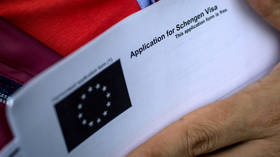EU Сommission approves suspension of visa deal with Russia

The European Commission has backed a proposal issued by EU foreign ministers to suspend an agreement with Moscow that allows Russian citizens to apply for visas under simplified procedures.
In a statement put out on Tuesday, the commission said it hopes the EU Council will approve the move and introduce stricter visa rules for Russians by next Monday.
“Russian citizens should not have easy access to the EU,” Ylva Johansson, the bloc's commissioner for home affairs, told reporters. “At the moment, there is no basis for trust, no basis for a privileged relation between EU and Russia.”
The new rules would make it more expensive and time-consuming for Russian citizens hoping to travel to the EU to get a visa. If approved by the Council, Russians would have to pay an €80 service fee instead of the previous €35 fee in order to apply for a visa.
Processing times for visas would also significantly increase if the deal is scrapped, possibly being extended to as long as 45 days, as opposed to the current ten days.
Additionally, long-term or multiple-entry visas for Russians could either be completely eliminated or severely restricted, meaning that Russian citizens would only be able to receive single-entry Schengen visas that are limited to specific dates.
The EU Commission is also proposing that the bloc remain open to certain categories of Russians, who are “travelling for essential purposes, including notably family members of EU citizens, journalists, dissidents and civil society representatives.”
The statement comes after the union’s foreign ministers voted last week to suspend the EU-Russia Visa Facilitation Deal, with top foreign policy official Josep Borrell stating that “border crossings from Russia into neighboring states” posed a security risk.
Moscow has warned that the European Union’s decision to suspend the visa deal would be met with retaliatory steps. Russian Deputy Foreign Minister Alexander Grushko stated last month that “violation, circumvention or withdrawal of the EU from the visa facilitation agreement with Russia will not remain without consequences,” and warned that the visa decision would ultimately do the bloc more harm than good.











